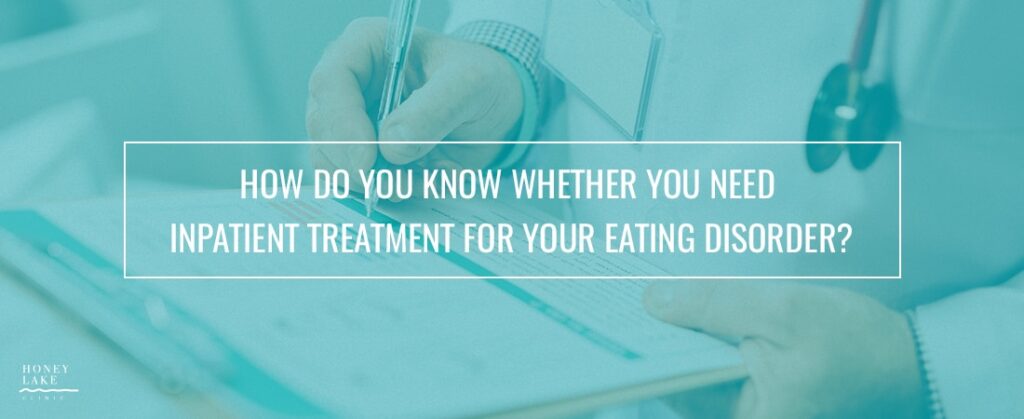How Do You Know Whether You Need Inpatient Treatment for Your Eating Disorder?
Are you or your loved one suffering from an eating disorder? Are you considering inpatient treatment?
Eating disorders are not phases, fads or lifestyle choices. They are serious mental disorders which impact you physically, psychologically and socially. They can be life-threatening.
Recognizing that you have an eating disorder is the first step to getting help for it. Eating disorders are treatable, and with the right treatment and support, you can get your life back on track. We can help.
Do you suspect you or someone you love has an eating disorder? Have a confidential conversation with a counselor right now. Call (888) 837-6577.
How do you know if you need inpatient treatment for your eating disorder?
Eating disorder inpatient treatment programs provide medical and psychiatric care for individuals with eating disorders. Many people with eating disorders will not need inpatient care. But for those who do, the care they receive is usually lifesaving.
While determining who needs inpatient versus outpatient care isn’t an exact science, here are a few common markers that could indicate inpatient treatment is needed:
Low Body Weight. Low body weight can be very dangerous sign. This is especially true for people who maintain a low weight for a long period of time, or who have experienced a rapid and significant weight loss.
The Academy of Eating Disorders recommends inpatient treatment for anyone battling an eating disorder who is below 75% of their ideal body weight. If your body weight is severely low, you’re at greater risk for experiencing dizziness, fainting, osteoporosis, amenorrhea, and other potentially life-threatening symptoms.
Electrolyte Imbalance – Electrolytes are salts and minerals, like potassium and sodium chloride, which allow our bodies to perform most of its vital biochemical functions. Eating disorder behaviors, like purging and restricting, can cause an electrolyte imbalance in your body. This can have serious consequences—conditions like—
- Hypokalemia, or low potassium, can be caused by purging behaviors like self-induced vomiting or laxative abuse. Low potassium levels can lead to heart arrhythmias and a weakened heart, which in turn can lead to sudden death.
- Hypernatremia, or too much sodium in the blood (think of it like dehydration on a cellular level), can also be caused by purging behaviors. Hypernatremia can cause cramps, seizures and comas.
Bradycardia – Bradycardia is an abnormally low heartrate—too slow. The excessive and rapid weight loss common among people with eating disorders begins with muscle shrinkage. The heart—which is a muscle—can start to shrink, too. As this happens, your body slows your heartrate to protect your weakening heart. This is an eating disorder complication that can be deadly. When your heartrate drops, you’re at great risk for heart arrhythmias, which can lead to sudden cardiac arrest and death.
Comorbid Conditions – A comorbid condition is essentially a co-existing concern. It is often the case that someone suffering with an eating disorder has a second comorbid condition like depression. If this is true of you, you may find that the symptoms of your depression render you unable to fully engage in addressing your eating disorder. Inpatient care can help stabilize your depression (or other comorbid condition) symptoms, affording you the right combination of care to reclaim your life.
Other Factors – Some very basic indicators that inpatient care is needed include things like:
- Suicidal thoughts or attempts
- Physical complications worsening or becoming life threatening
- Lab findings suggest acute risk
- Lack of recovery progress with lower levels of care, such as outpatient, intensive outpatient or partial hospitalization treatment
- Psychological impairment
Where to turn for help?
Ultimately, the best way to determine if you or someone you love needs inpatient treatment is to be evaluated by an eating disorder specialist. Evaluating the big picture—medically, psychologically, emotionally—is paramount to determining the appropriate level of care needed and getting started.
The decision to enter an inpatient treatment program can be daunting. There is much to consider. If you’d like help sorting through your options, give us a call at (888) 837-6577.
The Honey Lake Clinic Difference
At Honey Lake Clinic, our experienced staff, licensed therapists, psychologists, and psychiatric specialists understand that effective treatment for eating disorders requires a multifaceted, faith-based approach, involving healing of the body, mind, and spirit. Our unique treatment programs specifically and deeply address all three spheres, offering each client his or her greatest chance at wholeness and transformative growth.
This holistic approach and a combination of key factors makes the mental health program at Honey Lake Clinic different from the others in the country.
You’ll benefit from Honey Lake’s—
- Integration of a Bible-based approach and sound psychological principles
- Experienced, compassionate, and highly trained clinical staff
- Individualized treatment with a low caseload of patients per therapist
- Practical curriculum focused on decision-making mechanics and skills
- Emphasis on holistic healing of the mind, body, and spirit
